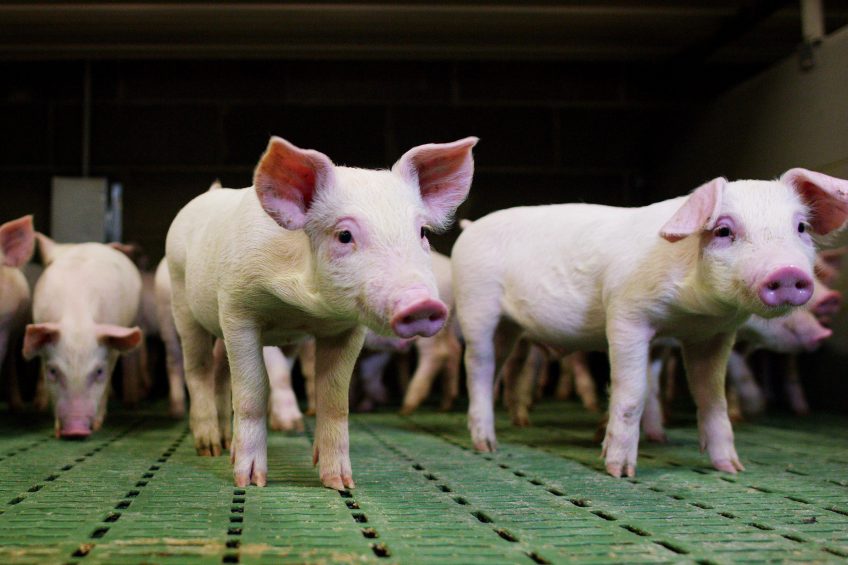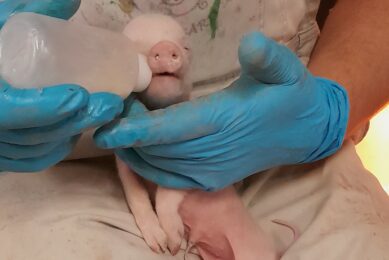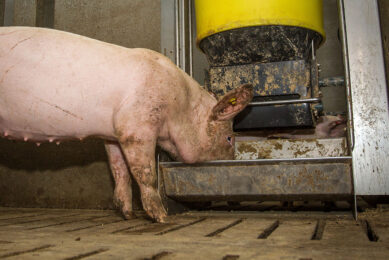Support piglet health and reduce mortality

Adjusting the pigs’ diets to help improve birthweight and support immune and gut health can work to improve piglet mortality, especially in antibiotic-free production.
In antibiotic-free production (ABF) programs, pigs are more susceptible to pathogens and the resulting negative effects on feed conversion and growth. It has been estimated that every increase of 1% in pre-weaning mortality can cause a reduction of approximately $ 0.30 USD of profit per marketed pig.
Low birthweight piglets have more chances of pre-weaning mortality and poor performance, which ultimately lead to high economic losses. An experiment conducted at a commercial facility evaluated if feeding sows chelated trace minerals as metal methionine hydroxy analog chelate (MMHAC) would benefit the progeny. Sows were fed diets containing either inorganic trace minerals (ITM) or organic trace minerals (MMHAC) at the same feeding level. A total of 18,000 gilts and sows up to parity seven were used in this experiment.
Research has shown that birthweight is directly related to a reduction in pre-wean mortality. Recent studies found that the survival rate for piglets with birthweights below 1.1 kg is around 58%, while those with birthweights above 1.1 kg, the survival rate increased to about 92%. When sows were fed diets with inorganic trace minerals, 32% of the piglets within litters weighed less than 1.1 kg at birth (Figure 1). This was reduced (P < 0.01) to 22.8% when sows were fed MMHAC diets, which represented an increase in birthweight of about 90 g.
Figure 1 – Sows fed Mintrex had fewer piglets at risk for pre-weaning mortality (birthweight below 1.1 kg).

Research has shown that for every 100 g increase in birthweight there is an increase in the survival rate of about two percentage points, yielding around 0.30 more weaned piglets per litter. Therefore, increasing progeny birthweight with MMHAC supplementation over ITMs in sow diets can reduce pre-weaning mortality and allow piglets to gain a running start to optimum lifetime growth performance.
Experiments with trace minerals
Trace minerals (zinc, copper, and manganese) are required for proper immune function. An experiment was conducted at a commercial farm with developing gilts to test the effect of MMHAC on immune response to vaccination. Gilts were fed diets containing 165 ppm zinc, 16.5 ppm copper, and 38.6 ppm manganese, either as an ITM or an equal mixture of ITMs and MMHAC. Gilts fed MMHAC reached the immunity threshold about eight weeks earlier after vaccination for Mycoplasma hyopneumonia when compared with gilts fed ITM, indicating that MMHAC fed gilts were more protected and had an overall better immune response. Dysfunctional immune systems can lead to increased morbidity and mortality in pigs, making immune responsiveness key to optimal performance.
An experiment conducted at a commercial facility with 700 pigs evaluated if feeding MMHAC would benefit piglets’ immune systems during the post-weaning period. Pigs were fed either 150 ppm from MMHAC or 150 ppm CuSO4 from 23 days of age up to 12 weeks. There was a decrease in mortality of 5.7 percentage units when piglets were fed diets containing MMHAC compared with piglets fed diets containing ITM (Figure 2). The improvement of the immune systems in piglets fed MMHAC also reduced therapeutic costs by 9.3%.
Figure 2 – Feeding MMHAC to piglets reduces post-weaning mortality.

The role of protease in gut health
At weaning, the transition from highly digestible to less digestible sources of protein is worsened by a decrease in secretion of endogenous protease and changes in gut lining morphology. These changes include the reduction of villus height and crypt hyperplasia, which results in impaired absorption of nutrients and gut health issues. Therefore, protease supplementation can help piglets to digest proteins, which reduces the amount of undigested protein reaching the hindgut. Consequently, gut health and immunity are maximised, and mortality is reduced, allowing piglets to reach their full growth potential.
A US study conducted at a commercial farm evaluated the use of exogenous protease in nursery piglet diets. A total of 1,200 piglets at 21 days of age were fed diets with or without protease. The group of piglets fed protease had a reduction of 37% in the mortality rate (Figure 3). A similar experiment was conducted in Thailand with 742 nursery piglets to determine the effect of feeding exogenous protease on mortality rate. The piglets fed non-supplemented diets had a mortality rate of 2.15%, and the piglets fed protease-supplemented diets had a 1.62% mortality rate, a reduction of 25%.
Figure 3 – Feeding exogenous enzyme reduces post-weaning piglet mortality (Days 0-42 post-weaning).

Feeding exogenous protease to piglets can improve gut morphology when compared to non-supplemented piglets. In addition, protease supplementation can increase feed intake right after weaning, which can improve intestinal morphology and gut health. Thus, the integrity of tight junctions that close the door for pathogens to enter the system can be preserved, leading to a reduction in post-weaning mortality.
Overall, feeding MMHAC (Mintrex trace minerals) compared to ITMs to sows improves foetal development and increases piglet birthweight, which in turn decreases the pre-weaning mortality rate. Minerals play a key role in supporting the immune system and lead to a better overall health and reduced mortality rates, which are vital to profitable production. These benefits were demonstrated by the improvement in vaccine response, reduced nursery mortality and reduced therapeutic treatment costs in experiments. Exogenous protease (Cibenza DP100 enzyme feed additive) also exhibited the ability to promote a healthy gut and to help reduce mortality by over 30%. Together, these nutritional strategies support the piglets’ immune function and gut health, leading to reduced mortality while improving production parameters and profitability.
 Beheer
Beheer





 WP Admin
WP Admin  Bewerk bericht
Bewerk bericht